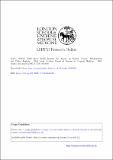| dc.description.abstract | Road traffic “accidents” are a major cause of morbidity and mortality in Kenya, exerting a
considerable burden on health care services. Human error is recognized as the leading cause.
Alcohol is suspected to be an important contributing factor, although such evidence has not
been documented, and specific policies and interventions do not currently exist. This study
aimed to establish the magnitude o f the contribution of alcohol in traffic crashes as a basis
for planning and developing drink-driving policy. The main objectives were:
1. To determine the incidence and characteristics of injury presentations in hospitals
and estimate injury-related workload.
2. To determine alcohol prevalence and distribution of blood alcohol concentration
(BAC) in casualties with different types o f injuries.
3. To estimate the contribution of alcohol in traffic crashes, in combination with data
from a roadside survey of drivers.
4. To establish the knowledge and perceptions of key informants and different groups
about causes of road “accidents”, effects of alcohol, awareness of road safety
measures, and the preferred interventions.
5. To explore the potential for successful development of drink-driving policy.
The research was undertaken in Eldoret, Kenya. It comprised three sub-studies employing
epidemiological methods complemented by focus group discussions, key informant
interviews, documents review, and policy analysis techniques. Relevant data was gathered
from 2,637 injury-affected hospital attenders, 479 drivers, 12 key informants and 3 focus
groups. The results indicated that:
1. Assaults are the most frequent cause of injuries requiring hospital treatment, while traffic
crashes are the leading reason for trauma-related admissions. Males and young adults aged
20-39 years are the most affected by traffic crashes and collisions. Children are affected
mainly by falls and bums. Traffic crashes lead to the most severe types of injuries, and
i
greater utilization of operating theatre, and inpatient services (total bed-days) than other
injury mechanisms.
2. Alcohol is most associated with assaults and traffic injuries. Alcohol-related injuries
predominantly involve men, and occur with a greater frequency on week-ends and at night.
Traffic crashes involving drivers and pedestrians are more likely, than passengers, to be
associated with alcohol.
3. Drinking and driving is common in the general driving population in Eldoret: on average
20% o f night-time drivers had imbibed some alcohol. Drinkers were mostly men aged over
24 years, driving personal cars on short trips. The risk of involvement in a road crash is six
times greater in drinking drivers and increases with the rise in BAC.
4. There is a general perception of the multifactorial nature of causation of road “accidents”,
comprising human, road, vehicle and social factors, with alcohol playing an important role.
Support for the introduction of drink-driving interventions is evident, although some
scepticism exists about effective enforcement and availability of resources.
5. Involvement and the support of key government ministries, non-govemmental institutions
and the commercial sector with interest in road transport and alcohol industry, and various
professionals in the decision-making process would increase the feasibility of successful
development of a public policy on drink-driving. The availability of convincing data is likely
to enhance the decision-making process.
Adverse effects of alcohol on driving increases the incidence of traffic injuries, potentially
avoidable by establishing drink-driving interventions. Successful formulation of a policy to
discourage driving under the influence of alcohol is feasible and will require working with
a range of stakeholders to establish a politically and financially feasible approach. | en_US |

